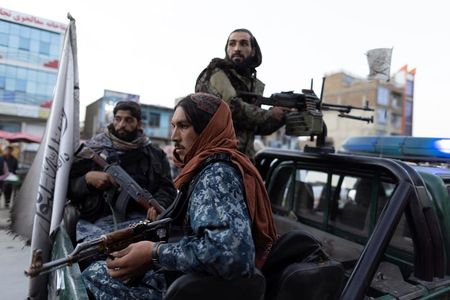
The Constructive Chaos in West and South Asia

The quest for global dominance has taken dangerous trends in different parts of the world. Starting from West Asia and North African states, as the Arab Spring; and into South Asia, with the Taliban taking over Afghanistan. During the Arab Spring, political Islam was introduced and regimes were replaced by the Muslim brotherhood organisations. This was a forceful movement, that took an ugly turn in many of the Arab countries where they began withering out and losing their mass support, as they distanced themselves from the people’s aspiration.
This rise of extremist forces led to more radicalisation and spread of terrorism. Especially in Libya, Syria and Iraq, where Turkey played a major role in promoting, arming and training terrorists mercenaries from all over the world. After the defeat of the terrorist organisation, ISIS, in Iraq, more of these mercenaries were siphoned into Libya and Azerbaijan and later into Afghanistan. They began fighting a new form of terrorism. This was privatisation of wars on behalf of the President of Turkey, whose government paid them salaries and compensation to their families when they were killed.
The sphere of US influence in the region is withering out. A desperate US is trying to maintain its global dominance and counter growing anti-American feeling in the region. The US while keeping a close watch on Russia and Iran, puts China as its top priority in order to contain its influence, regionally and globally. The US withdrawal from Afghanistan, though it was a sudden announcement, left behind sophisticated US arms and ammunition worth billions of dollars. This attracted the world community’s attention to the danger looming over Afghanistan and the real motives behind the US withdrawal, where a security vacuum was created.
There is fear of turning Afghanistan into a safe haven for terrorist organisations like Al Qaeda and ISIS once again. There are more than 20 terrorist organisations active in Afghanistan. This is despite the fact that the Taliban is trying to project itself as a reformed jihadist organisation capable of ruling Afghanistan. But the transitional government has mostly members from the Pashtun tribe and the Taliban cadets supported from Rawalpindi in Pakistan.
The new challenges to the Taliban government lie in the emergence of ISIS Khorasan, who have claimed responsibility for many of the terrorist attacks on mosques and Taliban forces. This new development is turning Afghanistan rapidly into a failed state especially with most of the trends and economic indicators predicting a collapse of the economy with the onset of winters. This would lead to more inter-fighting and the suffering of more than 30 million of the population.
This has also resulted in jittery reactions from neighbouring countries, especially the Commonwealth of Independent States (CIS). The CIS denied the US request for military bases. Russia had vehemently opposed the American request due to threat to its own national security with the presence of the American forces.
This however made the American administration go back to its old allies, Pakistan, to establish a military base to monitor and gather intelligence about the activities of terrorist organisations. This was also to ensure its continued influence in the region and also not to threaten American interests.
With the onset of COVID-19 and the sluggish economy in the Islamic countries, compounded by the failure of the ruling elites in improving the socioeconomic situation of the people, a counter revolution started appearing in these countries. A new form of violence has been emerging which threatens not only West Asia and North African states, but South Asia as well, especially Pakistan and Bangladesh, where there is a rise of Islamisation of Armed forces. This is what is known as constructive chaos. The US is trying to redraw maps on the basis of ethnic and religious lines to further divide these countries which will lead to more conflicts and chaos. This chaos will lead to more violence and fighting among different factions.
China on the other hand has shown keen interest in supporting the new Taliban government because of its Belt Road Initiative (BRI). They are trying to build up economic corridors through Pakistan into Afghanistan (CPEC) and invest heavily in the infrastructure of Afghanistan. The impact of the presence of China in the region is yet to be materialised. The full involvement of China will not be there until security is assured to the Chinese workers and Chinese nationals in Pakistan.
The US regional allies mainly Pakistan, Turkey and Qatar are playing a pivotal role in Afghanistan. President of Turkey Erdogan is trying to spread his influence and instigate the Turk nationality to revive the Ottoman Empire dreams. A desperate Erdogan is using all his cards to create new allies in the region and gain the attention of the United States, as a trusted ally who will be able to protect the American interest in the region. This has been amplified after the success of Azerbaijan in the war against Armenia over the disputed Karabakh Enclave. Now Erdogan is playing the sectarian cards, threatening the integrity of Iran by using the Azerbaijan issue. This is while his own country, Turkey, is witnessing a downfall of its currency and a sluggish economic growth under his leadership. He is also involved in continuously gagging the media and jailing those opposes his actions.
The Muslim Brotherhood Organisation is showing signs of losing their own influence in the region, especially in Morocco, Tunisia and were removed from power in Egypt. Turkey’s strategy failed but the extreme ideologies have spread. Even more so after the takeover of Afghanistan by the Taliban. This will impact countries like Russia, China, Uzbekistan, Tajikistan, Pakistan and India. Radical groups have started regrouping and are actively initiating sabotage operations in these countries. There is a grave danger hovering over the region that will hamper the economic growth and prosperity, lead to more instability, and the rise of fundamentalism.
India is watching the development closely in Afghanistan and the nexus between Afghanistan-Pakistan -Turkey and revival of militancy in Kashmir valley. They are concerned that the terrorists are going to take advantage of the Taliban at the helm of power in Afghanistan and attack Indian forces in the state of Jammu and Kashmir. While India is not in a hurry to recognise the Taliban, we can see the world is slowly talking to the Taliban and opening their missions in Afghanistan as a sign of de facto recognition of Taliban.
India while not recognising the Taliban, is ready to send humanitarian aid to the people Afghanistan. It is also open to form alliances in the region with those who are willing to counter the growth of terrorism and prevent the spread-over into its own territory.
**************
Disclaimer
The opinions expressed in this article are the author’s own and do not reflect the views of Chanakya Forum. All information provided in this article including timeliness, completeness, accuracy, suitability or validity of information referenced therein, is the sole responsibility of the author. www.chanakyaforum.com does not assume any responsibility for the same.
Chanakya Forum is now on . Click here to join our channel (@ChanakyaForum) and stay updated with the latest headlines and articles.
Important
We work round the clock to bring you the finest articles and updates from around the world. There is a team that works tirelessly to ensure that you have a seamless reading experience. But all this costs money. Please support us so that we keep doing what we do best. Happy Reading
Support Us





















POST COMMENTS (0)